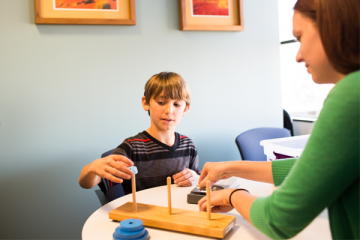Multidisciplinary Pediatric Mental Healthcare
At CHOC, we have a skilled multidisciplinary team of specialists for children and teens that includes psychiatrists, psychologists, nurses and social workers. We specialize in providing a full continuum of pediatric mental healthcare, including inpatient, intensive outpatient and outpatient program services. The team of pediatric mental health specialists provides:
- Psychiatric evaluation
- Medication management
- Psychotherapy
- Pediatric psychological testing
- Play therapy
- Neuropsychological evaluations
- Parent education and more
We also work with schools so that an appropriate educational program is in place to meet your child’s needs.
Our Pediatric Psychologists Are Part of Your Child’s Healthcare Specialists Team
Many health conditions, like epilepsy, cancer, diabetes or a rare disease, can affect a child’s mental health in addition to their physical health. Our pediatric psychologists are part of the care teams for CHOC’s many treatment programs, both inpatient and outpatient. That means both a child’s physical and mental health needs are always being met.
Patients and families can turn to our expert psychologists while receiving care anywhere at CHOC. If your child is hospitalized or has an appointment, and you would like to request a visit from a children’s psychologist, please let your nurse or doctor know. Our specialists team will develop a plan to care for your child.
Our pediatric psychologists can help patients of all ages and their families:
- Cope and understand an illness
- Manage pain
- Adhere to medication plans
- Deal with stress, anxiety, depression, grief, trauma and other psychosocial needs.
They use expert techniques ranging from “talk” therapy, to medical play, to alternative coping methods such as biofeedback. Our pediatric psychologists tailor treatments to each patient’s age, comfort level and unique needs.














